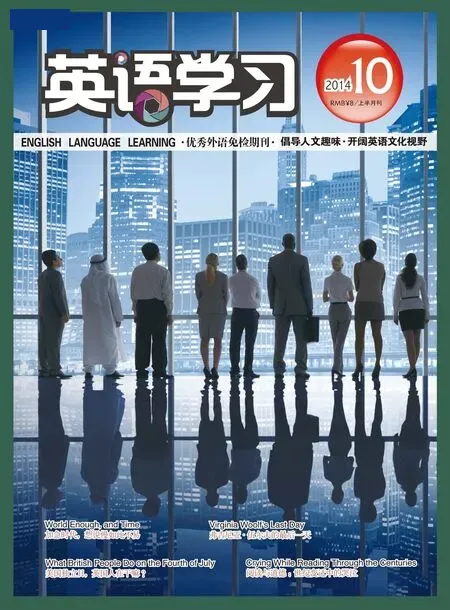何处觅乐土?
∷王伟滨

伊甸园
李白在《襄阳歌》中唱道,“清风明月不用一钱买”,但如今买“清风明月”不晓得要花多少钱。
朋友在微信上晒出在丽江古城旅游的幸福照,而我则刚刚从一个严重污染的城市,回到一个污染更为严重的城市,灰蒙蒙的夜空,刺鼻的空气味道。两个世界的反差,不由得让我想起去年一部美国影片Elysium。片名译作《极乐空间》,有些不知所云,不如干脆译作“极乐世界”或“极乐净土”来得简单干净。当然,这样译又不免会让人将它与并不相干的佛教思想联系起来。然而,推究起来,不管哪种文化、教派、思潮,最终不都是要找到那么一片“乐土”吗?可惜,几千年寻寻觅觅,我们离“乐土”似乎不是更近,而是更远了。
大致说来,古代人想象中的“乐土”,不外乎远离“劳作之苦”的一片田园,虽然在那里也并非全然无所事事,但人们终归不至忙于“土里刨食”,而有很多闲暇时光可以自由支配。按照《失乐园》里的说法,最初上帝为人类创造了“乐土”——伊甸(Eden),也称作乐园(Paradise),人类不需要做什么,便可以快乐地住在那里。那时,他们并没有被“欲望”侵染,也不懂得烦恼,就连为上帝看管园子的工作,也只是开心之事,根本与操劳无关:“Under a tuft of shade that on a green1. tuft: a patch,一片;green: grassy spot,草地。/ Stood whispering soft, by a fresh fountain side / They sat them down and, after no more toil /Of their sweet gardening labor than suf ficed / To recommend cool Zephyr,2. recommend: 此处=commend,夸赞;zephyr: the west wind,西风,和风。and made ease / More easy, wholesome thirst and appetite3. 显然,在伊甸园,适度劳作是为了更有胃口,心情更好。/ More grateful, to their supper-fruits they fell, / Nectarine fruits which the compliant boughs4. nectarine: sweet as nectar,甜如蜜的;compliant: yielding, obeying,顺从的。/ Yielded them, side-long as they sat recline / On the soft downy bank, damasked5. damasked: variegated,斑斓多样的。with flowers.”(Paradise Lost,Book IV, 325-334)。
可惜,这悠然自得的生活,因为人类始祖违抗了上帝的命令而转眼结束。上帝说:“Cursed is the ground for thy sake; in sorrow shalt thou eat of it all the days of thy life;thorns also and thistles shall it bring forth to thee; and thou shalt eat the herb of the field; in the sweat of thy face shalt thou eat bread, till thou return unto the ground; for out of it wast thou taken; for dust thou art, and unto dust shalt thou return”(Genesis3: 17-19)。因为人的“欲望”,从此再没有“免费的午餐”,“辛劳”、“痛苦”成为人生的核心词汇;从此,人类只能带着深深的遗憾,缅怀曾经的乐园:上帝派天使仗剑守卫伊甸园东门,“伊甸园之东”(East of Eden,John Steinbeck有关于骨肉相煎的同名小说)不仅是人类始祖的羞辱之地,也是杀弟的该隐(Cain)躲藏的罪恶之地(Genesis4:16)。于是,我们只能远眺彼岸的乐园,而“乐园此岸”(This Side of Paradise,Fitzgerald的小说题目)却全是忧伤。
不过,在诗人弥尔顿(Milton)看来,人类从乐园中被驱逐,却是为了我们有一天可以在上帝之子的教导下,重新回到这里;而这一次,是在经历了失去之后的回归——人生最大的幸福,不是失而复得吗?这也是弥尔顿试图解释“the ways of God”(Paradise Lost, Book I, 26)时所遵循的逻辑。于是,得到了重返乐园的许诺和途径,亚当与夏娃向他们曾经无忧无虑的日子告别,向一个新的世界走去。乐园也许本就是上帝为人类创造的温室,当他们“睁开眼”,便要去真正的世界闯闯了:“They looking back, all the eastern side beheld/ Of Paradise, so late their happy seat, / Waved over by that flaming brand6. 这是上帝安放在这里的不停旋转的冒火的剑,以驱赶亚当与夏娃。, the gate / With dreadful faces thronged(挤满)and fiery arms. / Some natural tears they dropped, but wiped them soon7. 眼泪很快被希望代替,因为他们得到了一个重回乐园的许诺。. / The world was all before them, where to choose / Their place of rest, and Providence(天道)their guide. / They hand in hand, with wandering steps and slow./ Through Eden took their solitary way.”(Paradise Lost,Book I, 641-649)
虽说,乐园终会失而复得,但这“复得”终究离现世的人们远些。按照基督教的说法,现世是短暂的,永恒要在人们穿过坟墓之后,才能实现:麻风病人拉撒路(Lazarus)在抛弃尘世痛苦屈辱的皮囊后,将在亚伯拉罕的怀里安眠(Luke16: 19-31);与耶稣一同钉上十字架的悔罪的罪人,将与基督一同步入乐园(Luke23: 43)。耶稣应许那些追随他的人们,离开这个物质世界之后,他们必将进入“kingdom of heaven”。
“heaven”与“paradise”都可译作“天堂”,但却有着不同的意思。从《创世记》记载的人类造通天塔的故事看,“heaven”应当是神在上界居住的地方,与人类始祖的“paradise”不同。以色列人的祖先雅各(Jacob),也曾经梦到直达天庭的阶梯,天使们在那里通行(Genesis28: 12),而人,哪怕是无罪的人,也不可以越级而上。基督许诺信徒们可以去“kingdom of heaven”,按照弥尔顿的说法,那是“a fairer Paradise”(Paradise Regained, Book IV, 613);然而,它已经不再是某个我们可以在今生找到的地方了。那曾经“实在的”、“具体的”乐园,已经随着人类始祖一同消失。从此,我们只能仰望。
自从文艺复兴时代起,“paradise”便开始与希腊神话中“Elysium”或“Elysian Fields”的概念相互影响,甚至逐渐互相代替。与“a fairer Paradise”一样,“Elysium”也是尘世之外的地方。按照希腊传说,它是地府(Hades)之外另辟出来的一片地方,本是与诸神或诸英雄有亲缘关系的人死后的去处,后来,扩大到被神灵选中的、正直的、或英勇的人们,在死后都可以来这里永享幸福生活。在电影《角斗士》(The Gladiator)中有一段慷慨激昂的台词——大敌当前,主帅Maximus对他的弟兄们说:“Three weeks from now I will be harvesting my crops, imagine where you will be and it will be so. Hold the line, stay with me. If you find yourself alone riding in green fields with the sun on your face, do not be troubled, for you are in Elysium and you’re already dead! Brothers, what we do in life, echoes in eternity!”
不过,与犹太人或基督徒不同,希腊人对现世的认可度显然要高许多;他们的神并不生活在虚无缥缈的天上,而是同样生活在地球上——奥林匹斯山顶,是众神居住的地方,大神宙斯的笑声,人们在山下也能时常听到。而“Elysian Fields”,按照荷马的说法,在地球的最西边,这里也被称作“Fortunate Isles”或“Isles (or Islands) of the Blessed”。古罗马作家Plutarch(普鲁塔克)这样描述“Elysium”,“These are two in number, separated by a very narrow strait; they are ten thousand furlongs(浪,1浪=220码=201.17米)distant from Africa, and are called the Islands of the Blest. They enjoy moderate rains at long intervals, and winds which for the most part are soft and precipitate(落下)dews, so that the islands not only have a rich soil which is excellent for plowing and planting, but also produce a natural fruit that is plentiful and wholesome enough to feed, without toil or trouble, a leisured folk.Moreover, an air that is salubrious(有益健康的), owing to the climate and the moderate changes in the seasons, prevails on the islands. For the north and east winds which blow out from our part of the world plunge into fathomless space, and,owing to the distance, dissipate(耗尽)themselves and lose their power before they reach the islands; while the south and west winds that envelope the islands sometimes bring in their train(紧随其后)soft and intermittent showers, but for the most part cool them with moist breezes and gently nourish the soil. Therefore a firm belief has made its way, even to the Barbarians, that here is the Elysian Field and the abode(住所) of the blessed, of which Homer sang.”(Plutarch,Life of Sertorius, VIII, 2)
正因为Elysium的具体与亲近,如今在世上,我们可以时时见到它的踪迹,许多地方更是直接唤作这个名字,其中包括闻名世界的巴黎香榭丽舍(Champs-élysées =Elysian Fields)。当然,因为Elysium离我们如此之近,便也不可避免地沾染了太多人类的气味。比如,美国著名剧作家Tennessee Williams(田纳西·威廉姆斯)的名剧A Streetcar Named
Desire(《欲望号街车》),故事发生的背景是New Orleans一条叫做Elysian Fields的真实存在的街道。可惜,在这里,女主人公Blanche并没有找到她的乐土,因为这里居住的人们,如她的妹妹Stella与妹夫Stanley,都是充满了野性和暴力之辈;这里仿佛是一片炼狱,但它不会把人的灵魂涤净,而是将它打碎,然后将那具躯壳拖入欲望的泥潭。
在电影Elysium描写的22世纪中叶,地球人口过剩、资源缺乏、空气污浊,大部分人在各种“血汗工厂”中讨生活。而在他们头顶上,有一个类似超大型宇宙空间站的东西,叫做Elysium,那里住着世界上最富有的人们。他们可以呼吸新鲜空气,可以远离疾病,可以不必辛劳,可以享受生活。而地球上的人们只能仰望,渴望有一天也能去那个地方。耶稣说:“Verily I say unto you, That a rich man shall hardly enter into the kingdom of heaven. And again I say unto you, it is easier for a camel to go through the eye of a needle, than for a rich man to enter into the kingdom of God.”(Matthew19:23-24)但是,Elysium拒绝穷人进入。

电影《极乐空间》
影片结尾,主人公终于通过自我牺牲,篡改了Elysium主控制台的程序,于是,所有地球上的人们都被接受为Elysium的合法公民了。然而,欢笑着的人们也许很快就会明白,少数人的乐园,Elysium的存在,总要以无数人在地狱里打拼为代价。一旦所有人被赋予Elysium的居民权,这居民权便没有意义了,因为不消说一个类似宇宙空间站的东西,即使像地球这么大的地方,在人类无休止的欲望“开发”之下,不也已经变成地狱了吗?剧终时,所有人怀着希望,朝这个向他们张开怀抱的地方跑去……但这也许不过是新的悲剧的开始。
其实,Elysium并不是谁创造出来的,它原本就在那里,只是因为人们创造出了地狱,才开始缅怀Elysium的美好。天堂与地狱本是同一个地方,因为居民的理解不同,于是便有了分别。与其焦急地等待,迫切地找寻什么Elysium,倒不如学着关心一下脚下的这一小方土地。

